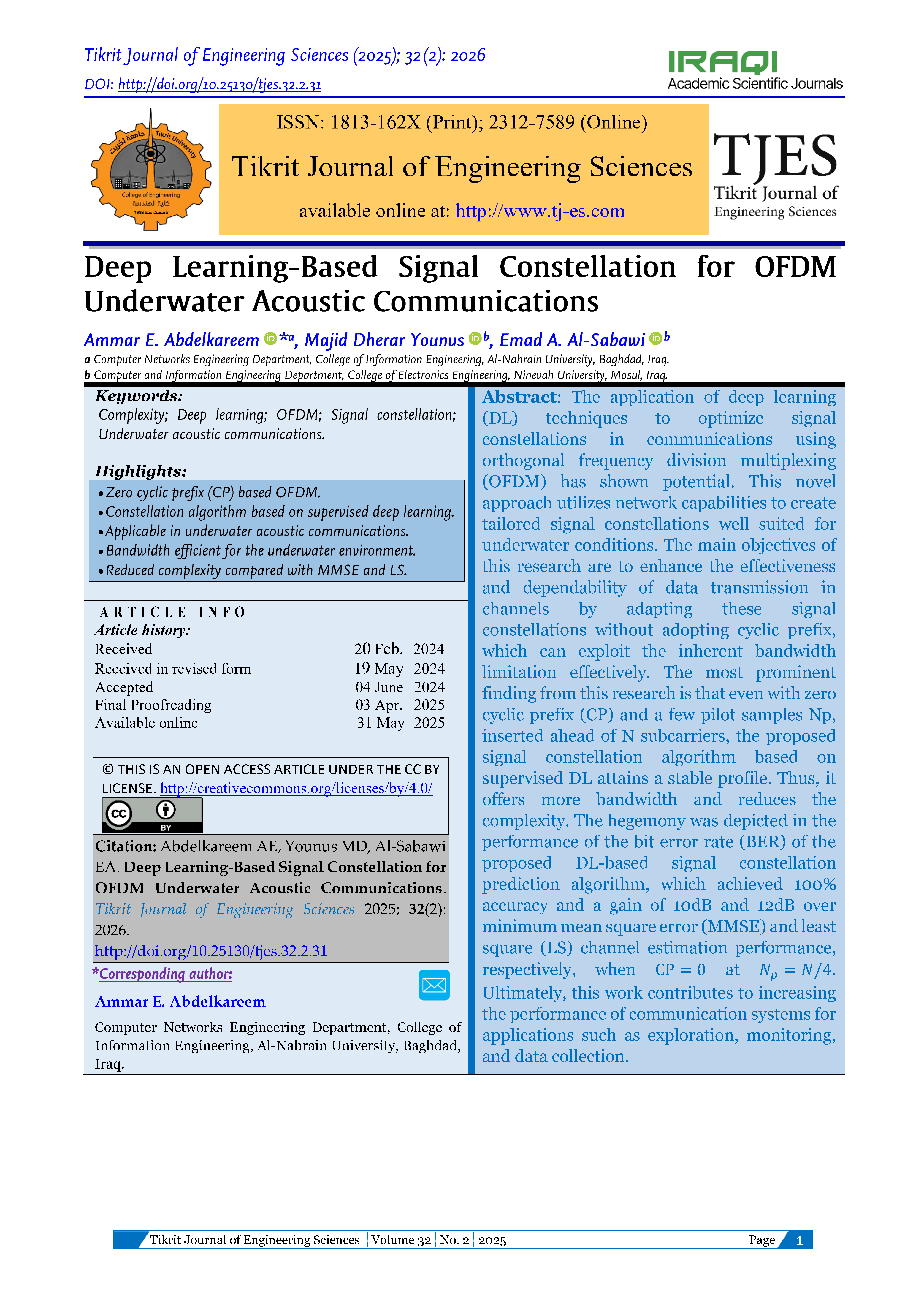Deep Learning-Based Signal Constellation for OFDM Underwater Acoustic Communications
محتوى المقالة الرئيسي
الملخص
لقد أظهر تطبيق تقنيات التعلم العميق إمكاناته لتحسين مجموعات الإشارات في الاتصالات باستخدام الأنظمة متعددة الارسال في تقيسم التردد المتعامد. يستخدم هذا النهج الجديد قدرات الشبكة لإنشاء مجموعات إشارات مصممة خصيصًا ومناسبة تمامًا للظروف الموجودة تحت الماء. الأهداف الرئيسية لهذا البحث هي تعزيز فعالية وموثوقية نقل البيانات، في القنوات من خلال تكييف مجموعات الإشارة هذه دون اعتماد بادئة دورية، والتي يمكنها استغلال قيود عرض النطاق الترددي المتأصلة بشكل فعال. النتيجة الأكثر وضوحًا التي تم التوصل إليها من هذا البحث هي أنه حتى مع وجود بادئة دورية صفرية وعدد قليل من العينات التجريبية، التي تم إدراجها قبل الموجات الحاملة الفرعية، فإن خوارزمية كوكبة الإشارة المقترحة المستندة إلى التعلم العميق الخاضع للإشراف تصل إلى ملف تعريف مستقر. يتم تصوير الهيمنة في أداء معدل خطأ البتات لخوارزمية التنبؤ بكوكبة الإشارة القائمة على التعلم العميق المقترحة، والتي تحقق دقة بنسبة 100٪ وكسب 10 ديسيبل و12 ديسيبل على الحد الأدنى لمتوسط الخطأ المربع وأداء تقدير القناة المربعة الأقل، على التوالي، مقابل صفر البادئة الدورية وطول الدليل هو ربع الموجات الحاملة الفرعية. وفي نهاية المطاف، يساهم هذا العمل في زيادة أداء أنظمة الاتصالات لتطبيقات مثل الاستكشاف والمراقبة وجمع البيانات.
تفاصيل المقالة
القسم

هذا العمل مرخص بموجب Creative Commons Attribution 4.0 International License.
THIS IS AN OPEN ACCESS ARTICLE UNDER THE CC BY LICENSE http://creativecommons.org/licenses/by/4.0/
المراجع
Kumar A, Srinivas KK, Majhi S. Automatic Modulation Classification for Adaptive OFDM Systems Using Convolutional Neural Networks with Residual Learning. IEEE Access 2023; 11:61013-61024.
An Z, Zhang T, Shen M, De Carvalho E, Ma B, Yi C, Song T. Series-Constellation Feature Based Blind Modulation Recognition for Beyond 5G MIMO-OFDM Systems with Channel Fading. IEEE Transactions on Cognitive Communications and Networking 2022; 8(2):793-811.
Zhang Y, Li C, Wang H, Wang J, Yang F, Meriaudeau F. Deep Learning Aided OFDM Receiver for Underwater Acoustic Communications. Applied Acoustics 2022; 187:108515.
Qin Z, Ye H, Li GY, Juang BH. Deep Learning in Physical Layer Communications. IEEE Wireless Communications 2019; 26(2):93-99.
Jebur BA, Alkassar SH, Abdullah MA, Tsimenidis CC. Efficient Machine Learning-Enhanced Channel Estimation for OFDM Systems. IEEE Access 2021; 9:100839-100850.
Zhang J, He H, Wen CK, Jin S, Li GY. Deep Learning Based on Orthogonal Approximate Message Passing for CP-Free OFDM. 2019 IEEE International Conference on Acoustics, Speech and Signal Processing (ICASSP) 2019:8414-8418.
Dossa RF, Huang S, Ontañón S, Matsubara T. An Empirical Investigation of Early Stopping Optimizations in Proximal Policy Optimization. IEEE Access 2021; 9:117981-117992.
Dos Santos Sousa H, Soares JA, Mayer KS, Arantes DS. CVNN-Based Channel Estimation and Equalization in OFDM Systems Without Cyclic Prefix. XLI Brazilian Symposium on Telecommunications and Signal Processing 2023.
Mohammed AS, Taman AI, Hassan AM, Zekry A. Deep Learning Channel Estimation for OFDM 5G Systems with Different Channel Models. Wireless Personal Communications 2023; 128(4):2891-2912.
Ye H, Li GY, Juang BH. Power of Deep Learning for Channel Estimation and Signal Detection in OFDM Systems. IEEE Wireless Communications Letters 2018; 7(1):114-117.
Liu H, Zhang Y, Zhang X, El-Hajjar M, Yang LL. Deep Learning Assisted Adaptive Index Modulation for MmWave Communications with Channel Estimation. IEEE Transactions on Vehicular Technology 2022; 71(9):9186-9201.
Zhang Q, Guo H, Liang YC, Yuan X. Constellation Learning-Based Signal Detection for Ambient Backscatter Communication Systems. IEEE Journal on Selected Areas in Communications 2019; 37(2):452-463.
Peng S, Jiang H, Wang H, Alwageed H, Zhou Y, Sebdani MM, Yao YD. Modulation Classification Based on Signal Constellation Diagrams and Deep Learning. IEEE Transactions on Neural Networks and Learning Systems 2019; 30(3):718-727.
Hong S, Zhang Y, Wang Y, Gu H, Gui G, Sari H. Deep Learning-Based Signal Modulation Identification in OFDM Systems. IEEE Access 2019; 7:114631-114638.
Abdelkareem AE, Sharif BS, Tsimenidis CC. Adaptive Time Varying Doppler Shift Compensation Algorithm for OFDM-Based Underwater Acoustic Communication Systems. Ad Hoc Networks 2016; 45:104-119.
Bai Q, Wang J, Zhang Y, Song J. Deep Learning-Based Channel Estimation Algorithm over Time Selective Fading Channels. IEEE Transactions on Cognitive Communications and Networking 2019; 6(1):125-134.
Awad SD, Sali A, Al-Wani MM, Al-Saegh AM, Mandeep JS, Raja Abdullah RS. End-to-End DVB-S2X System Design with DL-Based Channel Estimation Over Satellite Fading Channels at Ka-Band. Computer Networks 2023; 236:110022.
Shuxia G, Yang S, Ying G, Qianjin H. Low Complexity Minimum Mean Square Error Channel Estimation for Adaptive Coding and Modulation Systems. China Communications 2014; 11(1):126-137.
Zhang A, Lipton ZC, Li M, Smola AJ. Dive into Deep Learning. Cambridge: Cambridge University Press; 2023.
Hochreiter S, Schmidhuber J. Long Short-Term Memory. Neural Computation 1997; 9(8):1735-1780.





